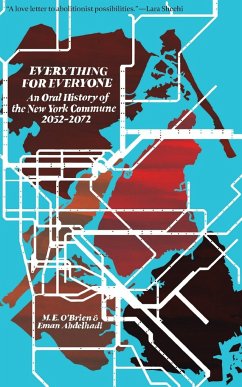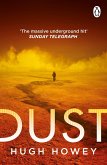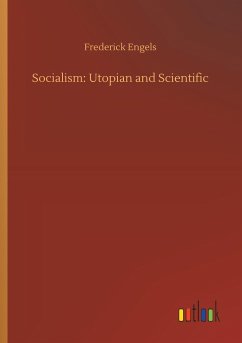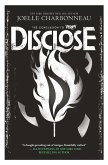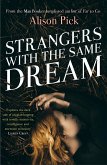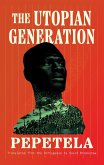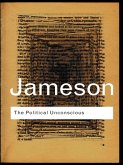M. E. O'Brien, Eman Abdelhadi
Everything for Everyone
An Oral History of the New York Commune, 2052-2072
16,99 €
inkl. MwSt.
Versandfertig in 1-2 Wochen

8 °P sammeln
M. E. O'Brien, Eman Abdelhadi
Everything for Everyone
An Oral History of the New York Commune, 2052-2072
- Broschiertes Buch
- Merkliste
- Auf die Merkliste
- Bewerten Bewerten
- Teilen
- Produkt teilen
- Produkterinnerung
- Produkterinnerung
Joining a long line of speculative writing that helps us to understand worlds not yet existing An Oral History of the New York Commune will appeal to readers of Octavia Butler, Ursula LeGuin, Kim Stanley Robinson, Ian M. Banks, Samuel Delaney, and China Mieville among others.
Andere Kunden interessierten sich auch für
![Dust Dust]() Hugh HoweyDust9,49 €
Hugh HoweyDust9,49 €![Ecotopia Ecotopia]() Ernest CallenbachEcotopia11,99 €
Ernest CallenbachEcotopia11,99 €![Socialism: Utopian and Scientific Socialism: Utopian and Scientific]() Frederick EngelsSocialism: Utopian and Scientific14,90 €
Frederick EngelsSocialism: Utopian and Scientific14,90 €![Disclose Disclose]() Joelle CharbonneauDisclose12,99 €
Joelle CharbonneauDisclose12,99 €![Strangers with the Same Dream Strangers with the Same Dream]() Alison PickStrangers with the Same Dream22,99 €
Alison PickStrangers with the Same Dream22,99 €![The Utopian Generation The Utopian Generation]() PepetelaThe Utopian Generation22,99 €
PepetelaThe Utopian Generation22,99 €![The Political Unconscious The Political Unconscious]() Fredric JamesonThe Political Unconscious30,99 €
Fredric JamesonThe Political Unconscious30,99 €-
-
-
Joining a long line of speculative writing that helps us to understand worlds not yet existing An Oral History of the New York Commune will appeal to readers of Octavia Butler, Ursula LeGuin, Kim Stanley Robinson, Ian M. Banks, Samuel Delaney, and China Mieville among others.
Hinweis: Dieser Artikel kann nur an eine deutsche Lieferadresse ausgeliefert werden.
Hinweis: Dieser Artikel kann nur an eine deutsche Lieferadresse ausgeliefert werden.
Produktdetails
- Produktdetails
- Verlag: Common Notions
- Seitenzahl: 258
- Erscheinungstermin: 2. August 2022
- Englisch
- Abmessung: 203mm x 127mm x 16mm
- Gewicht: 258g
- ISBN-13: 9781942173588
- ISBN-10: 194217358X
- Artikelnr.: 62350301
- Herstellerkennzeichnung
- Libri GmbH
- Europaallee 1
- 36244 Bad Hersfeld
- gpsr@libri.de
- Verlag: Common Notions
- Seitenzahl: 258
- Erscheinungstermin: 2. August 2022
- Englisch
- Abmessung: 203mm x 127mm x 16mm
- Gewicht: 258g
- ISBN-13: 9781942173588
- ISBN-10: 194217358X
- Artikelnr.: 62350301
- Herstellerkennzeichnung
- Libri GmbH
- Europaallee 1
- 36244 Bad Hersfeld
- gpsr@libri.de
M. E. O'Brien writes at the intersection of communist theory, trans liberation, LGBTQ social-movement studies, and feminism. A co-editor of Pinko, a magazine of gay communism, O'Brien's writing has appeared in Social Movement Studies, Work, Employment & Society, Commune, Homintern, Endnotes, and Invert. She worked with the NYC Trans Oral History Project and completed her PhD at NYU where her research considered how capitalism shaped NYC LGBTQ social movements. She currently works as a psychotherapist.
TABLE OF CONTENTS
1: Introduction: On Oral History and Insurrection, reflecting from the 20th
Anniversary of the New York Commune (co-written by O'Brien and Abdelhadi)
An ?academic? introduction reflecting on the value of oral history to make
sense of the transformative experience of participation in revolutionary
social change. It will outline the events of the 2040s that led to the
revolutionary outbreak in the New York City region, including the defeat of
the United States in a protracted war in Iran, the secessionist outbreaks
across multiple rural regions of the US, the broader context of global
rebellion and the formation of the Communes of the Andes, of Guangdong, of
the Maghreb, of the Levant and of the Mississippi River Delta.
2: Miss Kelley on the Insurrection of Hunts Point (O'Brien)
A sex work activist describing the events of 2052, when mass hunger riots
in the South Bronx led to the direct seizure of the Hunts Point Produce
Market, and the establishment of the regional food distribution networks
that fed the coming decade of urban civil war.
3: Kawkab Hassan on Liberating the Levant (Abdelhadi)
A transnational activist and freedom fighter, Kawkab Hassan recounts her
life of struggle across the globe. She grew up amidst the Palestinian
community of Bay Ridge, Brooklyn, and migrated to her grandparents' native
Palestine in the mid-20s to join the Gaza Rebellion. Designated a terrorist
and stripped of her American citizenship, she was unable to return to the
United States for decades and instead dedicated her life to resistance
movements in the Arab world.
4: Tanya John on the Free Assembly of Barretto Park (O'Brien)
Tanya had led the logistics and planning for the Free Assembly of Barretto
Park, a convening in 2055 that is widely regarded as a turning point in the
revolutionary struggle in NYC.
5: Belquees Chowdhury on Lower Manhattan (Abdelhadi)
Lower Manhattan remained relatively immune to the broader insurrection
engulfing NYC until an occupation of the Borough of Manhattan Community
College in early 2056, where Belquees was a student. She describes growing
up in an immigrant Bengali family in Queens, becoming a taxi driver and
student. At BMCC, she became active in CUNY Against the War, the leading
group in the 2056 occupation.
6: Quinn Liu on Internment, Guangxi and Flushing (Abdelhadi)
Quinn Liu was born in 2025 in an immigrant internment camp in Northern
California, set up in the aftermath of the COVID-19 crisis. Her parents
were Chinese immigrants who lost their jobs and legal status after the 2020
immigration ban. Living without documentation for a couple of years, they
were eventually captured and placed in a camp.
7: S. Addams on the Church Fathers of Staten Island (O'Brien)
S. describes growing up in the fascist, Christian cult that eventually came
to run Staten Island from 2053 to 2058. They describe the isolation and
brutality women faced under the Church Fathers, indicating that they were
considered a young girl and teenage woman in the Church.
8: Aniyah Reeds on Sex Work in Uptown (Abdelhadi)
Aniyah Reeds describes her evolving relationships with sex work and sex
education throughout the revolutionary decades leading up to the New York
Commune's 20th Anniversary. Over the course of two decades in the trade,
she becomes the de facto leader of an informal sex worker collective.
9: Connor Stephens on the Fall of Colorado Springs (O'Brien)
Connor recounts being born on the Wind River Reservation, and was attending
highschool in Riverton when the civil war began. After a decade of
participating in guerilla war across the Rocky Mountain States, he became a
commander in the North American Liberation Front.
10: Latif Timbers on Gestation Work (Abdelhadi)
Latif Timbers speaks about his work as a counselor in his commune's
gestation center in Flatbush, Brooklyn. As the interview goes on, he
reveals the traumatic events of his childhood.
11: Kayla Puan on the North Ironbound Commune (O'Brien)
A 2069 interview with a young trans artist planning a major 'sojourn', a
coming of age trip, and her understanding of her family's role in
establishing the residential communes of Newark.
12: Alkasi Sanchez on the Mid-Atlantic Free Assembly (O'Brien)
The Mid-Atlantic Free Assembly in 2072 both celebrated the 20th Anniversary
of the New York Commune, and was the closest to a formal codification of
the major social institutions that constituted the new communist society.
Alkasi, a social planner and militant theorist invited to give an opening
speech to the Assembly, reflects on the peculiarities of how gender,
subjectivity and geography have changed over the course of their life.
1: Introduction: On Oral History and Insurrection, reflecting from the 20th
Anniversary of the New York Commune (co-written by O'Brien and Abdelhadi)
An ?academic? introduction reflecting on the value of oral history to make
sense of the transformative experience of participation in revolutionary
social change. It will outline the events of the 2040s that led to the
revolutionary outbreak in the New York City region, including the defeat of
the United States in a protracted war in Iran, the secessionist outbreaks
across multiple rural regions of the US, the broader context of global
rebellion and the formation of the Communes of the Andes, of Guangdong, of
the Maghreb, of the Levant and of the Mississippi River Delta.
2: Miss Kelley on the Insurrection of Hunts Point (O'Brien)
A sex work activist describing the events of 2052, when mass hunger riots
in the South Bronx led to the direct seizure of the Hunts Point Produce
Market, and the establishment of the regional food distribution networks
that fed the coming decade of urban civil war.
3: Kawkab Hassan on Liberating the Levant (Abdelhadi)
A transnational activist and freedom fighter, Kawkab Hassan recounts her
life of struggle across the globe. She grew up amidst the Palestinian
community of Bay Ridge, Brooklyn, and migrated to her grandparents' native
Palestine in the mid-20s to join the Gaza Rebellion. Designated a terrorist
and stripped of her American citizenship, she was unable to return to the
United States for decades and instead dedicated her life to resistance
movements in the Arab world.
4: Tanya John on the Free Assembly of Barretto Park (O'Brien)
Tanya had led the logistics and planning for the Free Assembly of Barretto
Park, a convening in 2055 that is widely regarded as a turning point in the
revolutionary struggle in NYC.
5: Belquees Chowdhury on Lower Manhattan (Abdelhadi)
Lower Manhattan remained relatively immune to the broader insurrection
engulfing NYC until an occupation of the Borough of Manhattan Community
College in early 2056, where Belquees was a student. She describes growing
up in an immigrant Bengali family in Queens, becoming a taxi driver and
student. At BMCC, she became active in CUNY Against the War, the leading
group in the 2056 occupation.
6: Quinn Liu on Internment, Guangxi and Flushing (Abdelhadi)
Quinn Liu was born in 2025 in an immigrant internment camp in Northern
California, set up in the aftermath of the COVID-19 crisis. Her parents
were Chinese immigrants who lost their jobs and legal status after the 2020
immigration ban. Living without documentation for a couple of years, they
were eventually captured and placed in a camp.
7: S. Addams on the Church Fathers of Staten Island (O'Brien)
S. describes growing up in the fascist, Christian cult that eventually came
to run Staten Island from 2053 to 2058. They describe the isolation and
brutality women faced under the Church Fathers, indicating that they were
considered a young girl and teenage woman in the Church.
8: Aniyah Reeds on Sex Work in Uptown (Abdelhadi)
Aniyah Reeds describes her evolving relationships with sex work and sex
education throughout the revolutionary decades leading up to the New York
Commune's 20th Anniversary. Over the course of two decades in the trade,
she becomes the de facto leader of an informal sex worker collective.
9: Connor Stephens on the Fall of Colorado Springs (O'Brien)
Connor recounts being born on the Wind River Reservation, and was attending
highschool in Riverton when the civil war began. After a decade of
participating in guerilla war across the Rocky Mountain States, he became a
commander in the North American Liberation Front.
10: Latif Timbers on Gestation Work (Abdelhadi)
Latif Timbers speaks about his work as a counselor in his commune's
gestation center in Flatbush, Brooklyn. As the interview goes on, he
reveals the traumatic events of his childhood.
11: Kayla Puan on the North Ironbound Commune (O'Brien)
A 2069 interview with a young trans artist planning a major 'sojourn', a
coming of age trip, and her understanding of her family's role in
establishing the residential communes of Newark.
12: Alkasi Sanchez on the Mid-Atlantic Free Assembly (O'Brien)
The Mid-Atlantic Free Assembly in 2072 both celebrated the 20th Anniversary
of the New York Commune, and was the closest to a formal codification of
the major social institutions that constituted the new communist society.
Alkasi, a social planner and militant theorist invited to give an opening
speech to the Assembly, reflects on the peculiarities of how gender,
subjectivity and geography have changed over the course of their life.
TABLE OF CONTENTS
1: Introduction: On Oral History and Insurrection, reflecting from the 20th
Anniversary of the New York Commune (co-written by O'Brien and Abdelhadi)
An ?academic? introduction reflecting on the value of oral history to make
sense of the transformative experience of participation in revolutionary
social change. It will outline the events of the 2040s that led to the
revolutionary outbreak in the New York City region, including the defeat of
the United States in a protracted war in Iran, the secessionist outbreaks
across multiple rural regions of the US, the broader context of global
rebellion and the formation of the Communes of the Andes, of Guangdong, of
the Maghreb, of the Levant and of the Mississippi River Delta.
2: Miss Kelley on the Insurrection of Hunts Point (O'Brien)
A sex work activist describing the events of 2052, when mass hunger riots
in the South Bronx led to the direct seizure of the Hunts Point Produce
Market, and the establishment of the regional food distribution networks
that fed the coming decade of urban civil war.
3: Kawkab Hassan on Liberating the Levant (Abdelhadi)
A transnational activist and freedom fighter, Kawkab Hassan recounts her
life of struggle across the globe. She grew up amidst the Palestinian
community of Bay Ridge, Brooklyn, and migrated to her grandparents' native
Palestine in the mid-20s to join the Gaza Rebellion. Designated a terrorist
and stripped of her American citizenship, she was unable to return to the
United States for decades and instead dedicated her life to resistance
movements in the Arab world.
4: Tanya John on the Free Assembly of Barretto Park (O'Brien)
Tanya had led the logistics and planning for the Free Assembly of Barretto
Park, a convening in 2055 that is widely regarded as a turning point in the
revolutionary struggle in NYC.
5: Belquees Chowdhury on Lower Manhattan (Abdelhadi)
Lower Manhattan remained relatively immune to the broader insurrection
engulfing NYC until an occupation of the Borough of Manhattan Community
College in early 2056, where Belquees was a student. She describes growing
up in an immigrant Bengali family in Queens, becoming a taxi driver and
student. At BMCC, she became active in CUNY Against the War, the leading
group in the 2056 occupation.
6: Quinn Liu on Internment, Guangxi and Flushing (Abdelhadi)
Quinn Liu was born in 2025 in an immigrant internment camp in Northern
California, set up in the aftermath of the COVID-19 crisis. Her parents
were Chinese immigrants who lost their jobs and legal status after the 2020
immigration ban. Living without documentation for a couple of years, they
were eventually captured and placed in a camp.
7: S. Addams on the Church Fathers of Staten Island (O'Brien)
S. describes growing up in the fascist, Christian cult that eventually came
to run Staten Island from 2053 to 2058. They describe the isolation and
brutality women faced under the Church Fathers, indicating that they were
considered a young girl and teenage woman in the Church.
8: Aniyah Reeds on Sex Work in Uptown (Abdelhadi)
Aniyah Reeds describes her evolving relationships with sex work and sex
education throughout the revolutionary decades leading up to the New York
Commune's 20th Anniversary. Over the course of two decades in the trade,
she becomes the de facto leader of an informal sex worker collective.
9: Connor Stephens on the Fall of Colorado Springs (O'Brien)
Connor recounts being born on the Wind River Reservation, and was attending
highschool in Riverton when the civil war began. After a decade of
participating in guerilla war across the Rocky Mountain States, he became a
commander in the North American Liberation Front.
10: Latif Timbers on Gestation Work (Abdelhadi)
Latif Timbers speaks about his work as a counselor in his commune's
gestation center in Flatbush, Brooklyn. As the interview goes on, he
reveals the traumatic events of his childhood.
11: Kayla Puan on the North Ironbound Commune (O'Brien)
A 2069 interview with a young trans artist planning a major 'sojourn', a
coming of age trip, and her understanding of her family's role in
establishing the residential communes of Newark.
12: Alkasi Sanchez on the Mid-Atlantic Free Assembly (O'Brien)
The Mid-Atlantic Free Assembly in 2072 both celebrated the 20th Anniversary
of the New York Commune, and was the closest to a formal codification of
the major social institutions that constituted the new communist society.
Alkasi, a social planner and militant theorist invited to give an opening
speech to the Assembly, reflects on the peculiarities of how gender,
subjectivity and geography have changed over the course of their life.
1: Introduction: On Oral History and Insurrection, reflecting from the 20th
Anniversary of the New York Commune (co-written by O'Brien and Abdelhadi)
An ?academic? introduction reflecting on the value of oral history to make
sense of the transformative experience of participation in revolutionary
social change. It will outline the events of the 2040s that led to the
revolutionary outbreak in the New York City region, including the defeat of
the United States in a protracted war in Iran, the secessionist outbreaks
across multiple rural regions of the US, the broader context of global
rebellion and the formation of the Communes of the Andes, of Guangdong, of
the Maghreb, of the Levant and of the Mississippi River Delta.
2: Miss Kelley on the Insurrection of Hunts Point (O'Brien)
A sex work activist describing the events of 2052, when mass hunger riots
in the South Bronx led to the direct seizure of the Hunts Point Produce
Market, and the establishment of the regional food distribution networks
that fed the coming decade of urban civil war.
3: Kawkab Hassan on Liberating the Levant (Abdelhadi)
A transnational activist and freedom fighter, Kawkab Hassan recounts her
life of struggle across the globe. She grew up amidst the Palestinian
community of Bay Ridge, Brooklyn, and migrated to her grandparents' native
Palestine in the mid-20s to join the Gaza Rebellion. Designated a terrorist
and stripped of her American citizenship, she was unable to return to the
United States for decades and instead dedicated her life to resistance
movements in the Arab world.
4: Tanya John on the Free Assembly of Barretto Park (O'Brien)
Tanya had led the logistics and planning for the Free Assembly of Barretto
Park, a convening in 2055 that is widely regarded as a turning point in the
revolutionary struggle in NYC.
5: Belquees Chowdhury on Lower Manhattan (Abdelhadi)
Lower Manhattan remained relatively immune to the broader insurrection
engulfing NYC until an occupation of the Borough of Manhattan Community
College in early 2056, where Belquees was a student. She describes growing
up in an immigrant Bengali family in Queens, becoming a taxi driver and
student. At BMCC, she became active in CUNY Against the War, the leading
group in the 2056 occupation.
6: Quinn Liu on Internment, Guangxi and Flushing (Abdelhadi)
Quinn Liu was born in 2025 in an immigrant internment camp in Northern
California, set up in the aftermath of the COVID-19 crisis. Her parents
were Chinese immigrants who lost their jobs and legal status after the 2020
immigration ban. Living without documentation for a couple of years, they
were eventually captured and placed in a camp.
7: S. Addams on the Church Fathers of Staten Island (O'Brien)
S. describes growing up in the fascist, Christian cult that eventually came
to run Staten Island from 2053 to 2058. They describe the isolation and
brutality women faced under the Church Fathers, indicating that they were
considered a young girl and teenage woman in the Church.
8: Aniyah Reeds on Sex Work in Uptown (Abdelhadi)
Aniyah Reeds describes her evolving relationships with sex work and sex
education throughout the revolutionary decades leading up to the New York
Commune's 20th Anniversary. Over the course of two decades in the trade,
she becomes the de facto leader of an informal sex worker collective.
9: Connor Stephens on the Fall of Colorado Springs (O'Brien)
Connor recounts being born on the Wind River Reservation, and was attending
highschool in Riverton when the civil war began. After a decade of
participating in guerilla war across the Rocky Mountain States, he became a
commander in the North American Liberation Front.
10: Latif Timbers on Gestation Work (Abdelhadi)
Latif Timbers speaks about his work as a counselor in his commune's
gestation center in Flatbush, Brooklyn. As the interview goes on, he
reveals the traumatic events of his childhood.
11: Kayla Puan on the North Ironbound Commune (O'Brien)
A 2069 interview with a young trans artist planning a major 'sojourn', a
coming of age trip, and her understanding of her family's role in
establishing the residential communes of Newark.
12: Alkasi Sanchez on the Mid-Atlantic Free Assembly (O'Brien)
The Mid-Atlantic Free Assembly in 2072 both celebrated the 20th Anniversary
of the New York Commune, and was the closest to a formal codification of
the major social institutions that constituted the new communist society.
Alkasi, a social planner and militant theorist invited to give an opening
speech to the Assembly, reflects on the peculiarities of how gender,
subjectivity and geography have changed over the course of their life.
